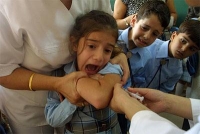Andrew Wakefield’s 13-year research that linked the MMR vaccine to autism was quashed this January when BMJ Wakefield’s 1998 clinical study
According to a related story on NPR’s All Things Considered
The Centers for Disease Control and Prevention (CDC) and American Academy of Pediatrics firmly agree that immunizations are safe and effective in preventing harmful or deadly diseases in children, such as Hib, polio, and measles—diseases that are now virtually eradicated thanks to standardized immunizations. But that still doesn’t dismiss the fact that, according to a 2010 pediatric study quoted in Seth Mnookin’s new book The Panic Virus, 25 percent of parents believe vaccines could cause developmental problems, such as autism, in children.
According to local pediatrician, Dr. Michael Kelly, the trend to forego or delay vaccinations has increased over the last few years in Louisville. “We have not had an outbreak, to my knowledge, here in Kentucky of measles. My fear is that we will start having outbreaks of polio again due to poor immunization rates,” Dr. Kelly said.
“Some pediatricians and family doctors refuse to have patients in their practice that will not fully vaccinate their children…Although I do not believe there is solid evidence to suggest vaccines are harmful, I certainly wish to respect the parents urge to do what is best for their children.”
Cindy Law and Andy Pappano are two of those parents. “The risks outweighed the benefits. Why would you put mercury in your children?” Pappano said, referring to Law and Pappano’s decision against inoculating their three children. They based their decision on the toxic ingredients found in some vaccines (mercury being one of them), the hasty studies (less than a year for the HPV vaccine) conducted with little information concerning long-term effects of the drugs, and uncertainty concerning the necessity of preventing eradicated diseases they consider harmless (like chicken pox). Wakefield’s recent discredit does not persuade them otherwise as they feel it is merely a “hit piece.”
Law and Pappano endure “The Speech” each time they take their children to the doctor about the severity, including death, of not inoculating children against preventable diseases. “Doctors give me their speech, but not one can guarantee my child’s safety from the vaccine and/or the disease,” Law said.
Thimerosal, a compound that is 49.6 percent ethyl mercury by weight, according to the National Network of Immunization Information website, has been used as a preservative in vaccines since the 1930s. Scientists, including the recently debunked Wakefield, linked mercury poisoning to autism due to the commonality of symptoms in the two conditions. Parents of children with autism began noticing the onset of the disease in their children shortly after a reaction to vaccines. According to The Panic Virus author, Seth Mnookin, this sparked the coalition Mercury Moms which led to a large-scale movement against vaccines. The political prowess of Mercury Moms backed by senators and celebrities, resulted in the removal of thimerosal from most vaccines in 2001, but it still remains in the flu vaccine and many other ear, eye, and topical solutions.
Mnookin contributes this trend to the ease and regulation-free information available on the Internet. Simply Google “vaccines” and “autism” and you’ll be swimming in opinions on both sides of the debate. Try “Jenny McCarthy” and you’ll find a mecca of anti-vaccination propaganda. In turn, peruse Mnookin’s book and you’ll be bombarded with emotionally charged, fear-based rhetoric about the risks of not inoculating your children. Stories of middle-class, educated mothers forgoing the Hib shot due to their personal research and ambivalence and having a near-death experience with their child are not unheard of. Polio and whooping cough cases have increased.
Then there are the countless testimonials about reactions to the vaccines. The CDC, the largest advocate for vaccines, lists the possible side-effects of each vaccine on its website: seizures, brain damage, and even death. Every year there are lawsuits are won against the pharmaceutical companies by parents claiming a link between a drug and their child’s condition. My own son had a pretty scary reaction to the DTaP that was, in fact, very real.
So what is the solution as a parent? With so much conflicting information out there, our research, logic, and intuition oftentimes play a tangled dance in our parental decision-making. I’ve been a parent that delayed shots because it just didn’t feel right to inject my healthy, vibrant infant with three to five different drugs at a time. It didn’t logically make sense to vaccinate my 24-hour old baby with a vaccine for Hepatitis that he might contract while doing drugs or having promiscuous sex. Still, I vaccinate sometimes because the benefits outweigh the risks and sometimes because it’s what I have to do to get my children admitted to public school. But every time I vaccinate, I am informed and inquisitive and respected by my pediatrician—a decision I am comfortable with.
Photo courtesy infowars.com.



